Archive for the "V-Day" Category
Posted — Filed under
V-Day
Tagged — No Comments
 This is the story of how a group of women who were shunned and abused and regarded as worthless came together – to transform the laws of their country, and save the lives of many more women like them.
This is the story of how a group of women who were shunned and abused and regarded as worthless came together – to transform the laws of their country, and save the lives of many more women like them.
By 2005, I had been working in Mexico for more than a decade with women who were being abused by their partners, when I was invited to a conference in Washington DC. There, I heard about an issue I knew nothing about – something called “human trafficking.” I was told about a sixteen year-old girl who was taken from her country and raped for money every day – and when she escaped, she committed suicide.
The story haunted me. When I came home to Mexico, I discovered there were no shelters for trafficking victims, and almost nothing to help them. I thought about how lucky I have been in my life – I had beautiful parents and a wonderful husband – and I thought: I have to show my gratitude. I must act.
I started to investigate to discover the extent of human trafficking in Mexico. One of the first people I spoke to was a senior police officer, who said to me: “Hey woman! Stop crying – these girls like it!”
A local charity took me to meet some prostituted women in Mexico City. I sat with 21-year old woman called Elisabeth Morales. I stood out as an older woman. I told her I liked her little black purse, and we began to talk. She started to tell me about how she had ended up in this situation.
When she was 15, she had gone to live with a man, and had two children – but her husband vanished to live in the United States, and she was left alone with no money. One day, she met a man who seemed very kind, and he offered to look after her. He came to meet her parents, and he really charmed them: he cooked for them and brought them presents and asked their permission to marry Elisabeth and take her with him to the distant city of Puebla.
When they arrived there, he said he was going to starve her unless she started to ‘work’ for him – as a prostitute. He locked her up and denied her food until she ‘agreed’. She was then forcibly prostituted for months on end. One day, when he was drunk, she smashed a bottle and waved it at him until she escaped. Free at last, she realized she was too ashamed and afraid to go back to her family – she thought he would come looking for her. Lost and alone, she came to Mexico City, and ended up back in prostitution.
I asked Elisabeth and two of her friends: do you want to get out of this life? They immediately said yes. I told them to pack their things at once and come with me. With others, I helped them to get accommodation and therapy. I watched as they changed, and went on to study at university. I thought to myself – every human is precious. Every life is like a whole world.
As soon as Elisabeth was in therapy, she said to me – we have to help other women. We can’t just leave them there.
The more women I met, the more horrific the stories I found were. I met a woman called Karla Jacinto. When we first rescued her and got her therapy, she was sixteen years old, and furious. If you told her you understood, she would hit the walls and yell that you couldn’t possibly understand. Eventually her story emerged. She was forced into prostitution from the ages of 12 to 16, and in that time, more than 40,000 men raped her. When she tried to refuse, she was tortured with a hot iron and whipped with cables. She showed us her scars.
As I started to investigate human trafficking, I discovered something that shocked me. The network of men running these organizations in Mexico runs to the very top – the politicians and police. It was clearly dangerous to intrude in this world – but we could not allow this crime to continue unopposed.
In 2009, I decided to run for the congress with ending human trafficking as my sole and only issue. I knew it would be almost impossible to win – I was up against a candidate with a very big majority and very strong political links, and I had very little money – but I wanted to raise awareness, and I believed the Mexican people would respond.
To everyone’s amazement – especially my own – I won with a big majority. On my first day in Congress, I gave every single other Member of Congress a video explaining what human trafficking is, and explained we had to outlaw it. Up to then, there was a poor patchwork of laws that did not properly punish the pimps.
Women who had been trafficked came in to the Congress to explain their stories and argue for a change in the law. One woman explained how her virginity was sold for $300. Another explained how she saw her father kill her mother when she was six and was sold into prostitution soon after. Along with many NGOs, these women and girls were the leading force in this fight. After their extensive lobbying, one of the toughest anti-trafficking laws in the world was passed – unanimously.
Mexico now has one of the highest rates of successful prosecution of human trafficking in the world. I saw the results in the life of a girl I worked with and admire deeply. At the age of 14, two female cousins walking by the side of the road when they dragged into trucks by the side of the road, and drugged. They woke up far away – to be raped. They were detained in a brothel: they saw another captive there was eight years old, and she was raped too. Their captor was a woman, who told them not to cry – I was trafficked too, she said, and far worse things happened to me.
One day, one of the cousins stole some water because she was so thirsty. The female pimp was furious and demanded to know who took it. The cousin didn’t say anything – so her fellow captive said that she had taken it, to protect her friend. The pimp started to beat the girl so severely that she died. Can you imagine the guilt?
Not long after, when the female pimp was very drunk, the girl escaped and stumbled out into the street. Through begging for help, she was finally – days later – able to stagger back into her hometown, exhausted and broken. But as soon as she got off the bus, people began to recognize her. The whole neighborhood had been looking for her when she vanished. But when they saw she was dressed as a prostitute, they began to jeer. “Do you know what you have done to your parents?” they began to yell. She was only five blocks from home – but she thought: I can’t go home. I am ruined.
She was torn – but she decided to go home. Her parents loved her and were so happy to see her. They supported her. The difference, I believe, between this girl becoming like the pimp-woman who tortured her, and recovering, was that love.
Now that girl has successfully testified against many of the men who abused her, and another trial is coming later this year. She has won. Her abusers are in prison.
Elisabeth, the first prostituted woman I met, is now a successful businesswoman. Karla , who at first was lost in rage and madness, has traveled all over the world testifying to her experiences. The NGOs we were involved in setting up help hundreds more women. I saw Karla talk at a conference in front of leading religious figures from all over the world – and at the end, on her own initiative, she led them in prayer. She felt no shame and no self-consciousness. She knew she is as good as anyone.
I have been involved in One Billion Rising – the movement for all the one billion women who have been abused to rise up as one each February 14th – since it began. I have seen in my own country and my own life what happens when the women who are regarded as marginal and worthless rise up. They transform themselves and they transform their countries.
In Mexico, a few thousand abused women rose up, and we have prevented a huge amount of trafficking. If one billion women rise, is there anything we would not be able to achieve?
As told to One Billion Rising.
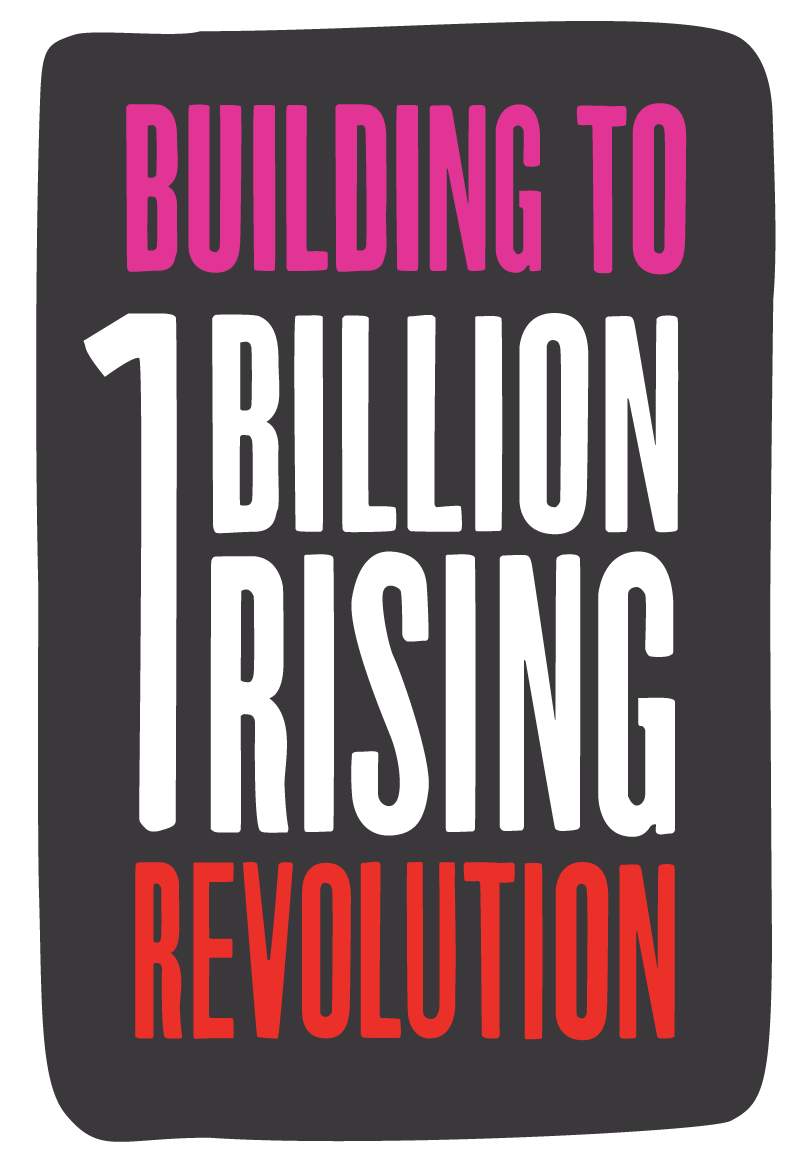 1 in 3 women across the planet will be beaten or raped during her lifetime. That’s ONE BILLION WOMEN AND GIRLS. Every February, we rise — in hundreds of countries across the world — to show our local communities and the world what one billion looks like and shine a light on the rampant impunity and injustice that survivors most often face. We rise through dance to express joy and community and and celebrate the fact that we have not been defeated by this violence. We rise to show we are determined to create a new kind of consciousness — one where violence will be resisted until it is unthinkable.
1 in 3 women across the planet will be beaten or raped during her lifetime. That’s ONE BILLION WOMEN AND GIRLS. Every February, we rise — in hundreds of countries across the world — to show our local communities and the world what one billion looks like and shine a light on the rampant impunity and injustice that survivors most often face. We rise through dance to express joy and community and and celebrate the fact that we have not been defeated by this violence. We rise to show we are determined to create a new kind of consciousness — one where violence will be resisted until it is unthinkable.
This year we are rising for Revolution. We are initiating a new series, “Building to One Billion Rising Revolution,” where we will be sharing stories of extraordinary activists who embody the creative radical shift in consciousness required to bring about CHANGE.
Grassroots activists who fight for justice and liberation with passion and joy.
Send us your stories. Stories change everything.
V-Day assumes no liability for any statements made by you on this page or that you otherwise submit to V-Day. Please remember that your post is public. Do not post real names, including your own, in association with your story.
Posted — Filed under
V-Day
Tagged — No Comments
I am writing to you today as a proud alumna of Mount Holyoke College and the mother of a graduating senior. I am also writing as the Editor of the leading interdisciplinary journal in feminist and gender studies, and a long-time feminist and queer theorist and activist – from my days at Mt. Holyoke to my middle-aged present.
First, let me say that I understand thoroughly that this decision – to discontinue production of The Vagina Monologues – emerged from a particular student group and is in no way reflective of the administration’s stand or positions on any issues at all. Indeed, I regret what appears to be a conflation in the popular press of numerous distinct issues. And I am convinced that campus feminists had and continue to have lively and thoughtful discussions around these and other issues, discussions that rarely get reflected in a mainstream press eager to find divisions and fault-lines within feminist communities. Indeed, the very fact that this was reported in a very conservative and anti-feminist venue – Campus Reform – should suggest that we take all the information circulating with at least a few grains of salt.
But I did want to write and voice my sadness at this turn of events. Had the students simply made a decision to produce other work and not gone out of their way to indict and attack Eve, one could imagine that this “controversy” would had never emerged in the first place. But the statement issued was a full-on indictment of the playwright as “exclusive,” “reductive,” “not intersectional,” etc.
Isn’t there a way to stand in solidarity with all kinds of identities/communities without simultaneously declaring something else “essentialist” or null and void in some way? Of course the theater group has every “right” to make a decision to produce other work, but truly that move needn’t entail a devaluation of Eve, her work, and the countless women (and men, and transfolk, and everyone else) throughout the world she has helped and inspired. It could have been done differently, for sure.
To insinuate that The Vagina Monologues is a transphobic play is patently absurd – what precisely would be the evidence for that argument? And to mistake and conflate issues of inclusion for issues of discrimination is a dangerous and sloppy political error. This is akin to calling the great epic Angels in America misogynist because it doesn’t include stories of women with AIDS.
Perhaps this could be as they say a “teachable moment” where we parse out the difference between, for example, debates around “inclusion,” and concerns about substantive bigotry and discriminatory and hateful representations. No doubt, there is plenty of real transphobia out there in the world to struggle against and in fact Eve has been in the forefront of just such movements to imagine a more gender-fluid and liberatory social and cultural world. And, much to my surprise, Mount Holyoke has increasingly been at the forefront of pushing the boundaries of gender and sexual expression. But pushing those boundaries should never – must never – mean that we lose an “economy of scale” and create instead a topsy-turvy world where allies are enemies and borders are policed in ever narrower ways. When that happens we let the real bigots off the hook and do a grave disservice to those activists and thinkers whose lives have been dedicated to human flourishing and gender and sexual freedom.
In solidarity –
Suzanna
Suzanna Walters
Editor-in-Chief
Signs: Journal of Women in Culture and Society
Director of Women’s, Gender, and Sexuality Studies
Professor of Sociology
Northeastern University
Author of The Tolerance Trap: How God, Genes, and Good Intentions are Sabotaging Gay Equality (NYU Press 2014)
Posted — Filed under
V-Day
Tagged — No Comments
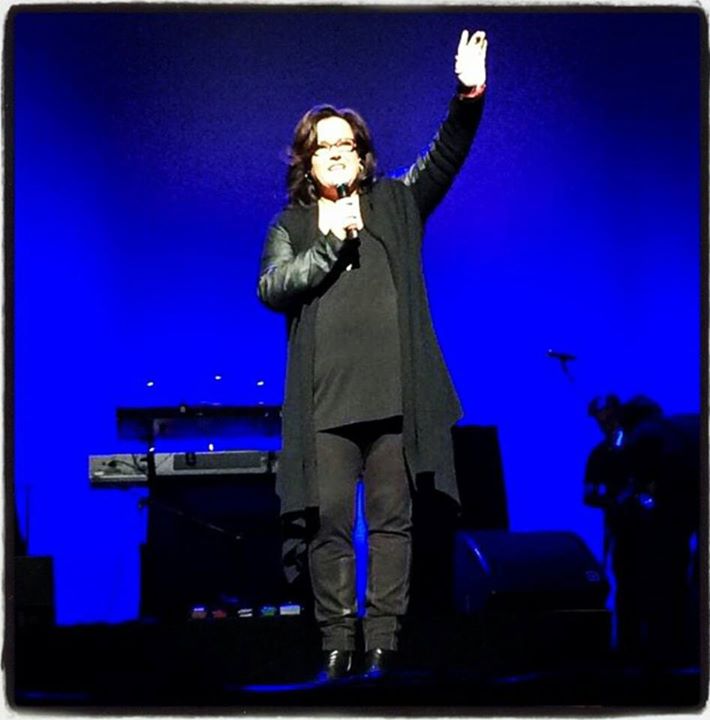 Actor, comedian, and activist Rosie O’Donnell will be RISING with us on Saturday, 7 February at the ARTISTIC UPRISING in NYC! Come join her and many other revolutionary performers, slam poets, dancers, singers and activists!
Actor, comedian, and activist Rosie O’Donnell will be RISING with us on Saturday, 7 February at the ARTISTIC UPRISING in NYC! Come join her and many other revolutionary performers, slam poets, dancers, singers and activists!
Tickets*: $25, $100 (includes One Billion Rising Revolution gift) & $1,000 (includes complimentary wine, champagne and beer for 2 hrs)
ALL TICKETS IN EACH SECTION ARE GENERAL ADMISSION.
BUY TICKETS >
*Proceeds will support our Rising work to end violence against women in Afghanistan, Democratic Republic of Congo, Kenya, and the Philippines.
Posted — Filed under
V-Day
Tagged — No Comments
Throughout V-Day’s history, trans women and trans men have been welcome to perform in The Vagina Monologues. In 2004, the first all transgender performance occurred in Los Angeles, the result of which was the creation of a new monologue “They Beat The Girl Out of My Boy…” which has been performed at V-Day events worldwide for the last 10 years.
Last week, students at Mount Holyoke College in Massachusetts, U.S., decided to retire The Vagina Monologues due to their belief that the play is not inclusive to transgender students. This has lead to a national discussion which has played out in many media outlets, and we wanted to take a moment to highlight some recent interviews, op-eds and statements that speak directly to this issue.
Despite some inaccuracies behind the decision at Mount Holyoke, V-Day and Eve stand in solidarity with students there in their fight against transphobia. As Eve states in her TIME op-ed, we “believe that this is a beautiful opportunity to hear each other’s stories in this ever-evolving journey toward liberation.”
TIME Magazine – Op-Ed by Eve Ensler
 “The Vagina Monologues never intended to be a play about what it means to be a woman. It is and always has been a play about what it means to have a vagina. In the play, I never defined a woman as a person with a vagina…”
“The Vagina Monologues never intended to be a play about what it means to be a woman. It is and always has been a play about what it means to have a vagina. In the play, I never defined a woman as a person with a vagina…”
CONTINUE reading at TIME.com >
READ “Vagina Monologues Playwright: ‘It Never Said A Woman Is Someone With A Vagina'” – (The Guardian) >
TIME Magazine – Op-Ed by Actor & Trans Feminist Julie Rei Goldstein
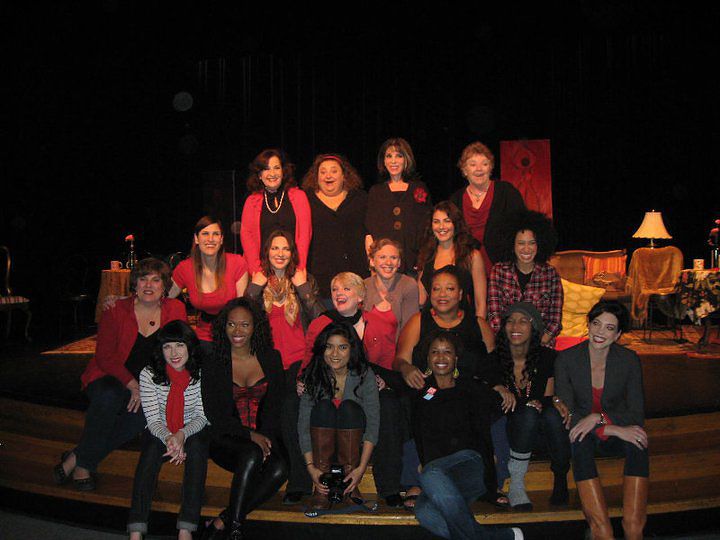 “The responsibility of trans inclusivity is not on V-Day as an organization or the material Eve Ensler has written. They have already provided all the tools you need to make it inclusive. It is on each individual production to use those tools to ensure all voices and experiences are heard. Even the monologue that highlights transgender women, They Beat the Girl Out of My Boy, includes varied perspectives from within the trans community across both gender expression and sexual orientation…”
“The responsibility of trans inclusivity is not on V-Day as an organization or the material Eve Ensler has written. They have already provided all the tools you need to make it inclusive. It is on each individual production to use those tools to ensure all voices and experiences are heard. Even the monologue that highlights transgender women, They Beat the Girl Out of My Boy, includes varied perspectives from within the trans community across both gender expression and sexual orientation…”
CONTINUE reading at TIME.com >
STATEMENT From Producers and Cast Members of First All-Transgender Benefit Performance of The Vagina Monologues
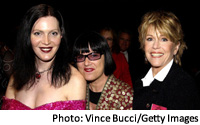 In 2004, Eve Ensler supplemented The Vagina Monologues, writing a transgender piece after having intimate conversations with a diverse group of women in our community. It debuted in 2004 as part of the first all-transgender performance, which was cast without regard to transgender surgical status.
In 2004, Eve Ensler supplemented The Vagina Monologues, writing a transgender piece after having intimate conversations with a diverse group of women in our community. It debuted in 2004 as part of the first all-transgender performance, which was cast without regard to transgender surgical status.
That trans-inclusive piece has been performed by trans and non-trans participants around the world as part of V-Day’s global fundraising efforts to end violence against women and girls. We feel it is one of many important steps which made the feminist movement more trans-inclusive.
CONTINUE reading at The Huffington Post >
Posted — Filed under
V-Day
Tagged — No Comments
By Eve Ensler (TIME)
Eve Ensler is a Tony-winning playwright activist and author of The Vagina Monologues. She founded both V-Day, a global movement dedicated to ending violence against women, and the One Billion Rising campaign.
Why I’m surprised students at Mount Holyoke College think The Vagina Monologues is not inclusive to transgender students
Twenty years ago, when I wrote The Vagina Monologues, it was very difficult to say the word vagina anywhere. The public utterance of the word alone was explosive as so much of the truth about what happened to vaginas was repressed, denied, kept secret, and coated in shame and self-hatred.
Sadly, I would argue, The Vagina Monologues is still relevant here in the U.S. and around the world. Over 51% of the population has vaginas, clitorises, vulvas, and many to this day do not feel comfortable, familiar, free, or endowed with agency over them. One out of three women will experience physical or sexual violence in her lifetime.
Ten years ago, I was thrilled when a group of transgender women decided to do an all-trans production of my play. In preparation for the show, we gathered for days of dialogue and sharing of stories that, at the request of the group, I turned into a theatrical monologue called They Beat the Girl Out of My Boy. Since that first performance in 2004, the monologue has been available for inclusion in the play through V-Day, the global activist movement that grew out of The Vagina Monologues. Offering the monologue to our activists around the world was a deliberate decision on my part to encourage communities to address the needs and realities of the transgender community. Trans women and trans men have been welcome to perform in The Vagina Monologues throughout its history.
So I was surprised to find that students at Mount Holyoke College have decided to retire The Vagina Monologues because they believe it is not inclusive to transgender students. Their statement reads, “At its core, the show offers an extremely narrow perspective on what it means to be a woman … Gender is a wide and varied experience, one that cannot simply be reduced to biological or anatomical distinctions.”
The Vagina Monologues never intended to be a play about what it means to be a woman. It is and always has been a play about what it means to have a vagina. In the play, I never defined a woman as a person with a vagina.
Inclusion doesn’t come from refusing to acknowledge our distinctive experiences, and trying to erase them, in an attempt to pretend they do not exist. Inclusion comes from listening to our differences, and honoring the right of everyone to talk about their reality, free from oppression and bigotry and silencing. That’s real inclusion — to listen to different stories, with curiosity, and love, and respect, in all their particular and distinctive human individuality.
We need to create a loving space for people with vaginas, and women without them, to address our oppressions, desires, and secrets and to simultaneously honor the fact that gender is not based on anatomy or genitalia.
This journey with The Vagina Monologues has been a huge privilege and honor. The play is my offering. Only that. I celebrate and support more and more voices and plays defying, wrestling with, and illuminating the dimensions and definitions of sexuality and gender.
I stand in solidarity with students at Mount Holyoke in their fight against transphobia. I believe this is a beautiful opportunity for us to hear each other’s stories in this ever-evolving journey toward liberation.
Posted — Filed under
V-Day
Tagged — No Comments
By Julie Rei Goldstein (TIME)
Julie Rei Goldstein is an actress, voice over artist and an ardent trans feminist.
The Vagina Monologues and V-Day have provided me with an avenue to promote trans visibility
My introduction to The Vagina Monologues and V-Day was over a decade ago. My girlfriend at the time worked at the Women’s Resource Center for San Jose State University and was in charge of organizing our school’s V-Day event. Being a theater major, she thought my participation would be a perfect fit. I did not know what to expect or how I would be received given that I am a transgender woman. What I found was the most diverse and accepting group of women I had ever had a chance to work with. I enjoyed my time so much that even to this day I jump at the opportunity to participate in local productions. Most recently I had the pleasure of participating in the 2011 Los Angeles V-Day event at the Barnsdall Gallery Theater.
Even though, at its core, V-Day encourages women to speak openly about vaginas, I have never found the conversation it encourages to be dependent on genitalia. What we have always sought to facilitate is highlighting the oppression women across the board have experienced through violence — trans misogyny included. The negative connotations our society has placed on the word vagina are a clear symbol of that oppression. As much as we would like to think that we have overcome those views, we are consistently reminded that we have not. For example, just two years ago, Rep. Lisa Brown was banned from the floor of the Michigan House of Representatives simply for saying vagina.
V-Day events are not just about speaking out, they are also about raising money for organizations working to prevent violence against women and to support those who have faced it. Many recipients of the funds raised have been transgender organizations. This should not come as a surprise to anyone given the alarming rates of violence trans women face, which disproportionately target trans women of color. The year I was fortunate enough to co-direct our school’s production, our team made the decision to donate what we had raised to a local housing organization for battered women. Furthermore we specified the organization we chose had to be trans inclusive.
The responsibility of trans inclusivity is not on V-Day as an organization or the material Eve Ensler has written. They have already provided all the tools you need to make it inclusive. It is on each individual production to use those tools to ensure all voices and experiences are heard. Even the monologue that highlights transgender women, They Beat the Girl Out of My Boy, includes varied perspectives from within the trans community across both gender expression and sexual orientation.
Just as I have been able to learn extensively from the diverse women I have worked with, I have also had the chance to teach others about my own persona. The experience has inspired them to highlight stories of trans women in their own work. V-Day has provided me with an avenue to provide trans visibility not just to them, but also to the audiences for which we have performed. When only 8% of people say they know someone who is transgender, lack of visibility can often be the most common barrier to acceptance.
Celebrating women through The Vagina Monologues doesn’t mean the experience is exclusive to having a vagina. I point to my own personal favorite monologue as one that does not even include the word vagina. Yet it still retains what I have always felt Eve Ensler sought to create: a vehicle for finding strength and beauty in what society considers to be your weakness.
Julie Rei Goldstein is an actress, voice over artist and an ardent trans feminist.
Posted — Filed under
V-Day
Tagged — No Comments
By Calpernia Addams, Andrea James, Lynn Conway, Valerie Spencer (Huffington Post)
We are representatives of the first all-transgender benefit performance of The Vagina Monologues.
In 2004, Eve Ensler supplemented The Vagina Monologues, writing a transgender piece after having intimate conversations with a diverse group of women in our community. It debuted in 2004 as part of the first all-transgender performance, which was cast without regard to transgender surgical status.
That trans-inclusive piece has been performed by trans and non-trans participants around the world as part of V-Day’s global fundraising efforts to end violence against women and girls. We feel it is one of many important steps which made the feminist movement more trans-inclusive.
The money our benefit performance raised went to Peace Over Violence, a trans-inclusive anti-violence nonprofit, the National LGBTQ Task Force, and V-Day’s annual focus of 2004, violence against women and girls in Juarez, Mexico. The interviews and performance became the 2005 film Beautiful Daughters.
V-Day’s and Eve’s amazing response to concerns presented to them by trans people has been inspirational. They made extraordinary efforts to make the play and the movement trans-inclusive, changing many hearts and minds in the process.
The goal of V-Day is to create a community which raises money and raises our voices together until violence against women and girls stops. Throughout the project’s history, Eve has added new monologues to include voices that were not heard in the original play.
Hurtful labels and divisiveness are antithetical to the social justice movement, which encourages building bridges and finding common ground around shared goals. We encourage all trans and genderqueer people interested in sharing their own unique voices to work with V-Day as we have. Our successful efforts with V-Day emerged from sharing our constructive criticism through direct outreach.
The V-Day movement and Eve’s play continue to evolve and respond to issues of the day, and our work with the movement was meant to be the start of a conversation about including sex and gender minorities. We encourage you to join us in working together to eliminate violence against all women and girls.
In love and solidarity,
Calpernia Addams, producer
Andrea James, producer
Lynn Conway, participant
Valerie Spencer, participant
Posted — Filed under
V-Day
Tagged — No Comments
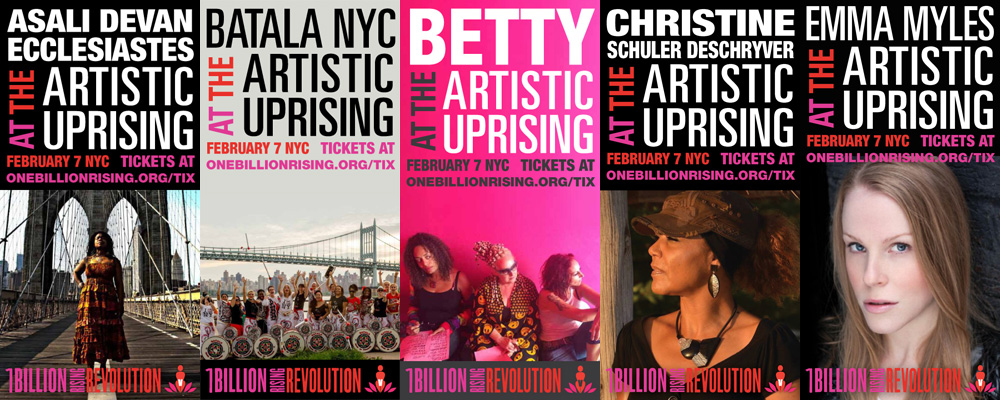
MAYA AZUCENA | BATALA NYC | BETTY | CLIMBING POETREE
CHRISTINE SCHULER DESCHRYVER | ASALI DEVAN ECCLESIASTES
EVE ENSLER | GINA LORING | MORELY | EMMA MYLES | KATHY NAJIMY
THANDIE NEWTON | AGNES PAREYIO | SUNNI PATTERSON | STREB
SWOON | KARABO TSHIKUBE | MONIQUE WILSON | Y3K
JAHA ZAINABU | ZOYA | & MORE TO BE ANNOUNCED
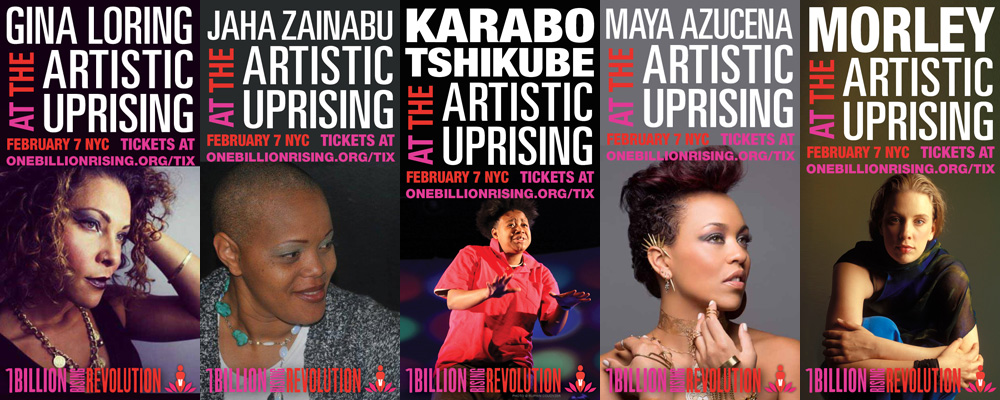
ARTISTIC UPRISING
Saturday, 7 February, 7PM
HAMMERSTEIN BALLROOM, NYC
A Revolutionary evening of Performance & Slam Poetry,
DANCING, Music, & Activist Inspiration
Tickets*: $25, $100 (includes One Billion Rising Revolution gift) & $1,000 (includes complimentary wine, champagne and beer for 2 hrs)
BUY TICKETS >
ALL TICKETS IN EACH SECTION ARE GENERAL ADMISSION.
All seated tickets are on a first come, first served basis within your chosen section.
*Proceeds will support our Rising work to end violence against women in Afghanistan, Democratic Republic of Congo, Kenya, and the Philippines.
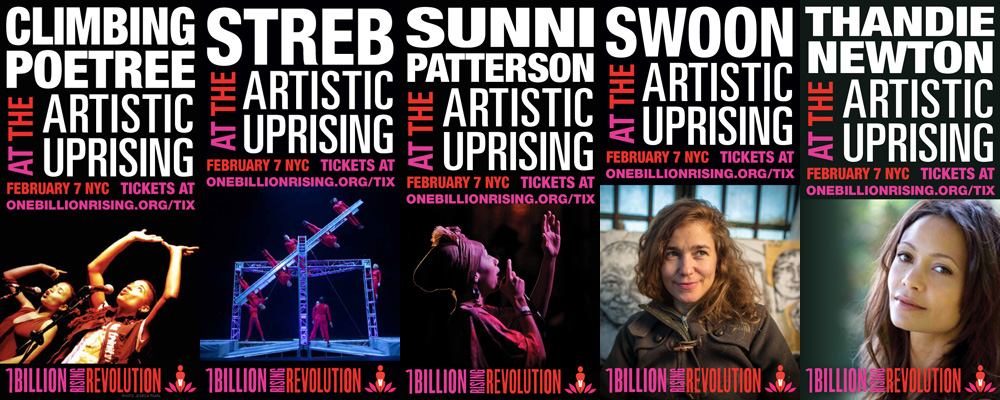
Posted — Filed under
V-Day
Tagged — No Comments
By Oliver Laughland (The Guardian)
After theatre group at all-female Mount Holyoke College blasts the play for not doing enough to include transgender people and people of colour, Eve Ensler tells the Guardian: ‘I would like to believe the play is outdated but sadly it isn’t’
The playwright Eve Ensler has dismissed claims made by a university theatre group that her famed play the Vagina Monologues is “inherently reductionist and exclusive”, insisting the play is just as relevant now as when it was first written.
Students at the all-female liberal arts school Mount Holyoke College have decided to break with a decade-long tradition of putting the play on at Valentine’s Day, arguing that it does not do enough to include transgender people and people of colour.
“At its core, the show offers an extremely narrow perspective on what it means to be a woman,” an email circulated circulated among members of the college’s Project Theatre group states.
The note, obtained by the student news website Campus Reform, continues: “Gender is a wide and varied experience, one that cannot simply be reduced to biological or anatomical distinctions, and many of us who have participated in the show have grown increasingly uncomfortable presenting material that is inherently reductionist and exclusive.”
The Project Theatre chair, Erin Murphy, a 22-year-old senior theatre student at the college, confirmed to the Guardian the email’s authenticity but declined to forward a copy.
The play, which premiered in 1996, is now performed all over the world on 14 February to raise awareness of gender-based violence.
“I would like to believe that the play is outdated and irrelevant but sadly it isn’t,” Ensler said. “I travel the planet, I’ve just come from many countries and the United States where 51% of the population has vaginas and aren’t able to have agency over those vaginas. We know that one out of every three women will be raped or beaten in her lifetime – so we know we have a long way to go before vaginas are liberated.”
Ensler told the Guardian that while she stood with the students at Mount Holyoke to fight transphobia, she disagreed that the play was in any way transphobic.
“I think it’s important to know that I never intended to write a play about what it means to be a woman, that was not what the Vagina Monologues ever intended to be,” Ensler said. “It was a play about what it means to have a vagina. It never said, for example, the definition of a woman is someone who has a vagina … I think that’s a really important distinction.”
Ensler added: “When we use language, we have to be very careful what we say.”
The Vagina Monologues is updated to include a new monologue every year. In 2005 Ensler added a new piece, entitled “They Beat the Girl Out of My Boy”, written entirely from the perspective of a trans person.
It has remained an optional piece for inclusion since it was written.
“I don’t think inclusion comes from refusing to acknowledge our distinctive experiences or trying to erase them. It comes from listening to our differences and of the right for everyone to talk about their reality – free from oppression and silencing,” Ensler said.
“I think we have to create a space for the over 3 billion women who have vaginas to talk about our vaginas – the oppressions, and suffering and secrets and pleasures they have – without it being seen as dominance and transphobia,” Ensler added.
“At the same time I say, as the Mount Holyoke students are saying, that we can’t define gender or womanhood based on anatomy and genitalia, right?”
Ensler drew attention to the fact that the play has been designed to include actors of colour.
“Thousands and thousands of women of colour [have] performed the Vagina Monologues for the last 20 years,” Ensler said, adding that the off-Broadway production featured a woman of colour in each cast for four years straight.
Murphy told the Guardian that Project Theatre had performed “They Beat The Girl Out Of My Boy” in 2010 but have not performed it since.
“We felt that the play didn’t reflect all of the voices of the Mount Holyoke community; as such we decided to create our own,” Murphy said. Mount Holyoke College has recently changed its admissions policy to allow trans people identifying as women to apply for entry.
“In our discussions among the board, we felt that the monologues in the current core that we perform offered one perspective on the experiences of people of colour, women of colour in society – we totally totally recognise the validity in that. But we felt it was maybe time to hear some other perspectives,” added Murphy.
Ensler said: “I celebrate people writing their own plays that unveil and undress sexuality and the dimensions of gender. I think there should be more and more and more plays written about that.”
Mara Kieslingis, the founding executive director of the National Center for Transgender Equality, said it was difficult to come down on either side of the debate about the play’s relevance.
“I don’t think you can expect any play to be anything other than the writer’s point of view. I do not know if the Vagina Monologues is an exception,” said Kieslingis. “But colleges also have an obligation to be open, accepting and inclusive to all students.”
Posted — Filed under
V-Day
Tagged — No Comments
By Lizzie Crocker (Daily Beast)
Mount Holyoke College is not allowing a performance of The Vagina Monologues after complaints it’s transphobic. But when did artistic censorship become a good feminist look?
Ever since the 1996 Off-Broadway premiere of The Vagina Monologues, written by Eve Ensler to “celebrate the vagina” women’s empowerment, the play has been performed annually at hundreds of colleges across the country, embraced for years by gender studies departments as the Holy Grail of feminism. But this year, Mount Holyoke College, an all-women’s university in Massachusetts, is permanently breaking from tradition over concerns that the play–long championed for its political correctness–is not politically correct enough.Mount Holyoke’s Project Theatre Board representative Erin Murphy provides a discursive explanation in a campus-wide email:
“At its core, the show offers an extremely narrow perspective on what it means to be a woman… Gender is a wide and varied experience, one that cannot simply be reduced to biological or anatomical distinctions, and many of us who have participated in the show have grown increasingly uncomfortable presenting material that is inherently reductionist and exclusive.”
Well, here’s a sentence I never thought I’d write: as a woman with a vagina, why shouldn’t I be able to watch this play? If the complaint is that The Vagina Monologues excludes certain women without vaginas and therefore must be struck from the stage, then my complaint is that you’re excluding me from watching something I want to see because my gender remains defined by my biological parts. Isn’t it “reductionist” to deny me the right to see something? When did censorship become a good look for the modern feminist?
It’s great that Mount Holyoke is not discriminating against prospective female students who may or may not have vaginas (the school recently changed its admissions policy to welcome male-to female transgender students). I’m all for the school setting a socially progressive example for other women’s colleges to welcome trans students.
But I cannot get behind the idea that a celebratory play–one that Ensler and other women’s groups have used to raise money towards fighting violence against women–must now be construed as an oppressive one. Or, as one student wrote on an anonymous online message board, that “female-validating talk about vaginas is now forbidden…under the guise of ‘progress.'”
I’m not a fan of the anti-male narrative in The Vagina Monologues, nor do I agree with the play’s implication that a woman’s mere utterance of the words “vagina” and “cunt” empowers her. For these reasons, the show is indeed reductionist. It’s also outdated, primarily because it was written 20 years ago, though Camille Paglia denounced Ensler back in 2000 for embodying a “painfully outmoded branch of feminism.”
Had Ensler penned The Vagina Monologues today, she may well have expanded her feminist manifesto to be more representative of women who don’t have vaginas.
But I am baffled by the argument that the play is “blatantly transphobic and treats race and homosexuality questionably,” as one student put it, and should thus be censored on campus in its original form. (Mount Holyoke is reworking the show to be more trans-inclusive, and to address its various “problems” with “other identities.”)
That the play doesn’t incorporate transgendered voices or feminists without vaginas does not make it “transphobic.” It remains a classic feminist play, one that was conceived a generation ago and distilled from interviews with 200 women about their vaginas.
If we follow Mount Holyoke’s logic, colleges should not stage any plays that are exclusive or derogatory in their representation of gender, race, homosexuality, or any other minority group–which would eliminate Shakespeare, Charles Dickens, and yes, female writers like Jane Austen, where female characters may prevail, but only after enduring pain and indignity.
Even Alice Walker’s The Color Purple features a woman being brutalized before becoming winningly independent. Should this feminist classic be banned because of its images of female subjugation?
We should applaud Mount Holyoke for wanting to stage a feminist show that is more trans-inclusive. But all texts are difficult, all are open to interpretation, and those published in the past were written in different times. Censoring them, or banning them, should not be the response of any sensible, thoughtful feminist. Not one play can be representative of everything. Write something as boundary-breaking as it once was yourself–but let The Vagina Monologues live on.
 This is the story of how a group of women who were shunned and abused and regarded as worthless came together – to transform the laws of their country, and save the lives of many more women like them.
This is the story of how a group of women who were shunned and abused and regarded as worthless came together – to transform the laws of their country, and save the lives of many more women like them.  1 in 3 women across the planet will be beaten or raped during her lifetime. That’s ONE BILLION WOMEN AND GIRLS. Every February, we rise — in hundreds of countries across the world — to show our local communities and the world what one billion looks like and shine a light on the rampant impunity and injustice that survivors most often face. We rise through dance to express joy and community and and celebrate the fact that we have not been defeated by this violence. We rise to show we are determined to create a new kind of consciousness — one where violence will be resisted until it is unthinkable.
1 in 3 women across the planet will be beaten or raped during her lifetime. That’s ONE BILLION WOMEN AND GIRLS. Every February, we rise — in hundreds of countries across the world — to show our local communities and the world what one billion looks like and shine a light on the rampant impunity and injustice that survivors most often face. We rise through dance to express joy and community and and celebrate the fact that we have not been defeated by this violence. We rise to show we are determined to create a new kind of consciousness — one where violence will be resisted until it is unthinkable.





